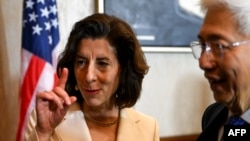During a trade mission visit to Manila this week, U.S. Commerce Secretary Gina Raimondo announced plans to invest more than $1 billion in the Philippines’ tech sector and help double the number of semiconductor factories in the country.
Observers say the pledge and visit highlight the Southeast Asian nation’s growing importance to Washington and will also help reduce the Philippine economy’s reliance on China.
"U.S. companies have realized that our chip supply chain is way too concentrated in just a few countries in the world," Raimondo said in remarks at a business forum on Tuesday.
"Forget about geopolitics. Just at that level of concentration, you know the old adage, ‘Don't put all your eggs in one basket.’ Why do we allow ourselves to be buying so many of our chips from one or two countries? That's why we need to diversify," Raimondo said.
American business executives from 22 businesses, including Alphabet's Google, Visa and Microsoft, joined Raimondo on the trip.
Possible expansion of chip industry
JC Punongbayan, resident economist and columnist of the online news website Rappler.com, said that while the Philippines is one of the key centers in the global electronics industry chain, it does not yet have the ability to manufacture smartphone or computer chips. The Philippines currently has 13 semiconductor factories that focus on assembly, packaging and testing.
"This commitment by the U.S. government to boost the local semiconductor industry is a welcome development because right now, even if semiconductors have figured prominently in trade statistics, these are not high value-added. So basically, we import a lot of components and then export them after assembly and packaging,” Punongbayan told VOA’s Mandarin Service.
“Hopefully, these investments by the U.S. government and private sector partners will enable the Philippines to export higher value-added goods in the future," he said.
Punongbayan believes that at a time when the Philippines is working hard to amend its regulations and hoping to attract more foreign direct investment, the promised investment from U.S. companies could provide a strong boost to the capital-starved country.
"We have had some difficulties when it comes to attracting foreign investments. And in fact, from 2020 to 2023, foreign direct investments dropped by more than 6% on an annual basis. So, we really need these investments in order to boost the economy,” Punongbayan said.
“And the billion-dollar investment pledge of the U.S. is several times the actual foreign direct investments that have come in recent years — in fact, almost nine times the foreign direct investment from the U.S. in 2023. These are very crucial to Philippine development,” he said.
During Raimondo’s two-day visit, U.S. companies committed to invest in the digital and energy sectors, areas that are in line with Manila's overall development plans and will help the Philippines' industrial upgrading and transformation, Punongbayan said.
Defense and economy
Dindo Manhit, president of the Stratbase ADR Institute for Strategic and International Studies, a policy think tank in the Philippines, said that over the years, the Philippines' economic growth has been mainly driven by strong consumption.
These investment commitments by U.S. companies will accelerate local economic growth, Manhit said, benefiting both the public and private sectors and positively affecting areas such as the Philippines' manufacturing supply chain and business process outsourcing.
He said these investments could also allow Manila to fully understand that strengthening its alliance with Washington will not only bring it defense assistance but also economic security.
"Because we all share values, democratic values. We value jobs for people. In the case of the Philippines, imagine if we can create jobs that could provide better income for Filipinos,” Manhit said. “Then we will see the strong partnership with the U.S. not limited to national security only, but also economic security."
Washington’s pledges of economic support for the Philippines comes at a time of rising tensions between Manila and Beijing over sovereignty disputes in the South China Sea.
Earlier this month, Philippine Secretary of Foreign Affairs Enrique Manalo warned that Manila is facing severe "economic coercion" from China. He also said the Philippines relies heavily on trade relations with China and hopes to expand economic and trade connections with other countries, including establishing formal free trade agreement negotiations with the European Union as soon as possible.
Punongbayan said that despite the disputes in the South China Sea, Manila continues to import a large amount of goods from China, which is the largest source of the country's trade deficit. That shows how difficult it is for the country to decouple its economy from China, and why it is imperative for Manila to lessen its dependence on Beijing.
Greater interest from the United States to invest in the Philippines is a step in the right direction, he said.
"If we import a lot from China, then indirectly we are boosting China's economy at the same time. And of course, part of the revenues coming from these payments to China will go to the Chinese government,” Punongbayan said. “So indirectly, in a way, the Philippines is funding China's incursions in the West Philippine Sea.”
Manhit, however, said compared with other Southeast Asian countries, the Philippine economy is not very dependent on China.
According to recent poll by Stratbase ADR Institute for Strategic and International Studies, the country Filipinos most want to maintain good economic relations with is the U.S., followed by Japan, while China ranks at the bottom.
He said the poll not only shows that China does not have as strong an economic influence on the Philippines as Beijing claims, but also that Filipinos are unanimously willing to expand economic cooperation with countries that share common democratic values, or values of human rights and the rule of law.
Adrianna Zhang contributed to this report.





